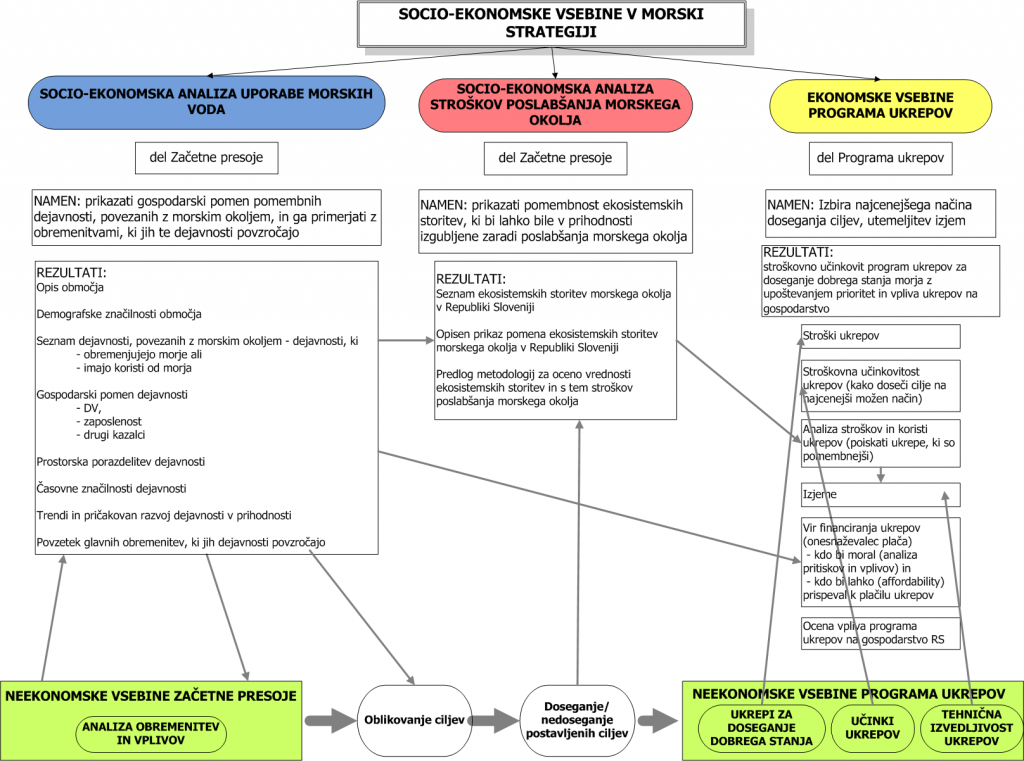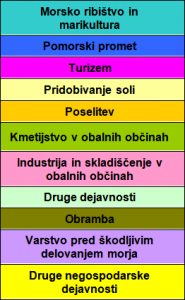Socio-Economic Analysis
The Republic of Slovenia’s marine area is intensely and extremely diversely utilised. Man’s marine and land activities impact the status of the marine environment. We need to keep in mind that having a healthy and clean marine environment is a precondition for performing various activities and as such provides certain benefits for the Slovenian economy and society. Many activities are dependent on the good environmental status of the sea, for example marine fishing, mariculture, tourism, extraction of salt, sports, recreation and leisure activities at sea and the observation of the marine environment. This also indirectly affects the value of real estate. Degradation of the environmental status of the sea could endanger certain jobs and sources of income in these businesses, causing the loss of other societal benefits and resulting in decreased quality of life. This is why activities related to the marine environment should be planned and implemented in a way that prevents their associated pressures from becoming too great. Only in this way will the marine ecosystems be able to ensure sustainable use of marine goods and services for current and future generations. This method of marine environment management is based on expert bases prepared by the IWRS.
The socio-economic analysis of the use of marine waters was drawn up according to the concept of marine modelling and includes information about the benefits provided by the marine environment to the Slovenian economy and society as well as about the potential pressures caused by the activities linked to the marine environment. It also provides data on where the activities are carried out, on trends and on the anticipated development of the activities in the future. As part of the analysis, we compared the actual and legitimate use of marine resources and assessed the amount of environmental pollution charges that could be levied had the water rights been issued.

The socio-economic analysis of the use of marine waters was drawn up according to the concept of marine modelling and includes information about the benefits provided by the marine environment to the Slovenian economy and society as well as about the potential pressures caused by the activities linked to the marine environment. It also provides data on where the activities are carried out, on trends and on the anticipated development of the activities in the future. As part of the analysis, we compared the actual and legitimate use of marine resources and assessed the amount of environmental pollution charges that could be levied had the water rights been issued.
Sectors included:
- Marine fishing and mariculture
- Sea transport
- Tourism
- Extraction of salt
- Settlement
- Agriculture in the coastal municipalities
- Industry and warehousing in the coastal municipalities
- Other activities
- Defence
- Protection against the harmful effects of the sea
- Other non-economic activities

Activities linked to the marine environment account for about 2% of the country’s overall added value and provide work for 2% of Slovenian employees. Sea transport, industry and warehousing in the coastal municipalities and tourism are the three most important sectors related to the marine environment in terms of added value and employment, with sea transport generating nearly half of the overall added value of the activities linked to the marine environment in Slovenia.
The key sectors that pollute the marine environment include settlement (housing of coastal areas, urban waste water, waste, etc.), tourism (pressures due to nautical tourism, etc.), sea transport (ship coatings, dredging of navigable waterways, anchoring, introduction of alien species through ballast water, the risk of incidental pollution, etc.) and fishing (fish harvesting, fishing with bottom trawling, anchoring, etc.).
Socio-Economic Analysis of the Cost of Degradation of the Marine Environment
Managing the marine environment includes considering what is going to happen in the future and what would be lost if the marine environment were not managed with care. Changes in ecosystems can have a major impact on the economy and society both in the present and in the future, which is why they need to be taken into account in planning and decision-making. This is why it is necessary to consider the cost of degradation of the marine environment or rather the potential damage in case of degradation of the environmental status of the sea.
Currently, discussing the cost of degradation would be difficult considering that the future environmental status assessment is still unknown. We can, however, determine the benefits presently provided by the marine ecosystem and thereby highlight the benefits that could be lost in the future. Benefits (goods and services) that people get from ecosystems are called ecosystem services. Most of the ecosystem services are difficult to evaluate, because they do not appear on the market so data about how much individuals are prepared to pay for them is usually not available. The IWRS has defined the ecosystem services of the marine environment in the Republic of Slovenia, chosen the appropriate methods for evaluating them and even tried out some of the methods by taking into account the available data.

In the upcoming years, the IWRS is going to draw up economic content for the action programme for achieving the environmental objectives. A cost-effectiveness analysis and a cost-benefit analysis of the proposed measures will be created in order to choose the best possible way of achieving the objectives. The sources of financing will be defined by taking into account the polluter pays principle.

